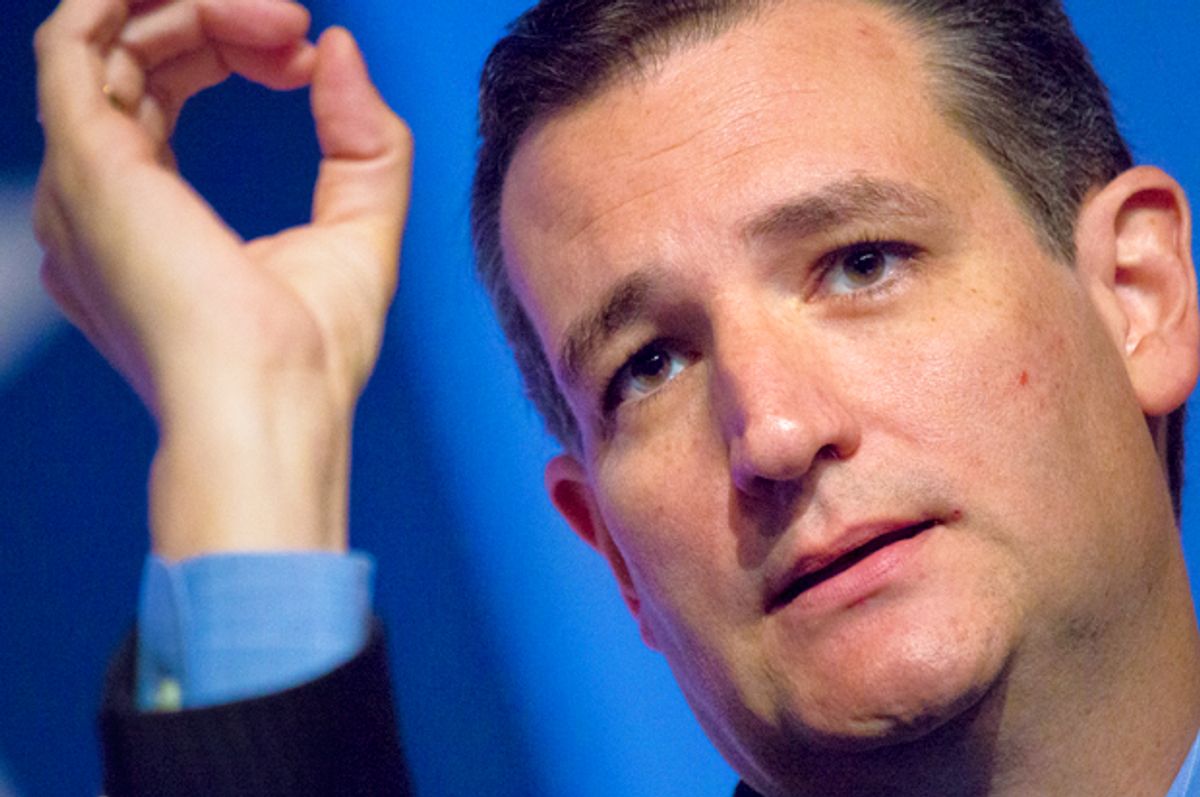Over the weekend, the New York Times ran a piece by Peter Baker examining the evolution of the Republican Party's Israel policy, a shift most evident in the nascent presidential primary contest.
"Where past Republican leaders had their disagreements with Israel, today’s Republicans have made support for the Jewish state an inviolable litmus test for anyone aspiring to national office," Baker argued. When he refers to "support for the Jewish state," Baker actually means reflexive support for the policies of Prime Minister Benjamin Netanyahu's right-wing government. Consider the case of former Secretary of State and current Jeb Bush adviser James Baker (no relation to Peter). Amid vociferous right-wing fury, Bush was forced to distance himself from Baker after the ex-diplomat criticized Netanyahu over his renewed opposition to a Palestinian state, noting that even when Netanyahu has asserted his support of statehood for the Palestinians, "his actions have not matched his rhetoric." Baker delivered his remarks before J Street, a left-leaning, pro-Israel advocacy organization with the temerity to suggest that perhaps Israel's interests would be best served by a genuine commitment to a peaceful settlement in the region, rather than blind adherence to Likudnik policy. In his speech, Baker reaffirmed "America's commitment to Israel," but his remarks were enough for some right-wingers to dub Bush the “anti-Israel candidate.”
If he has any say in the matter, Texas Sen. Ted Cruz will never confront such an allegation. Speaking with CNN's Dana Bash on Sunday, the newly-declared candidate rather stunningly stated that he would effectively outsource American policy on the Mideast peace process to the Israeli government, abdicating any leadership role for American diplomats.
Asked for his reaction to Netanyahu's pre-election vow never to allow a Palestinian state on his watch, Cruz replied, "I think the United States should stand unshakably with the nation of Israel. I think one of the most disgraceful aspects of the Obama presidency has been how it has treated Prime Minister Netanyahu —"
Bash interjected, noting that Cruz was not answering the question she had posed.
"I don’t think it should be America dictating the solution there. Israel is a sovereign nation," Cruz replied. "And I trust the leaders of Israel to determine whether they want to adopt a one-state solution or a two-state solution. So what I’m saying is we should trust Israel to make that determination."
Let's not lose sight of what a radical notion this is: Cruz is stating flat-out that he will obsequiously defer to the Netanyahu government on the question of Palestinian statehood, abandoning the explicit policy of Presidents George W. Bush and Barack Obama to support the creation of an independent state for the Palestinian people. Under President Cruz, America's policy would be that there is no policy until Israel enunciates its own.
To be sure, Cruz added that he could see the U.S. facilitating talks between the parties, but he reiterated that any movement on the issue hinged on the whims of the Israeli government.
"I think that is a decision for the nation of Israel," Cruz told Bash.
The way Cruz frames it, only the most fanatical opponent of Israel could oppose his reflexively pro-Netanyahu policy. Any other policy would amount to "dictating" to Israel what the final parameters of peace would be. Cruz is setting up a straw man. Nobody is arguing for dictating the outcome, but Cruz is perfectly content to allow Netanyahu to dictate to the Palestinians that they shall remain stateless.
Watch the interview below, courtesy of CNN:



Shares